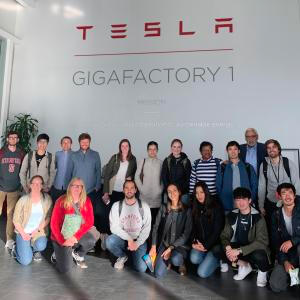
An innovative new course charges up students and industry!
Battery Systems, EE/CEE 292X combines industry research with student creativity.
During Fall quarter, professors Abbas El Gamal, Electrical Engineering (EE) and Ram Rajagopal, Civil and Environmental Engineering (CEE), co-organized an interdisciplinary seminar / project course, Battery Systems for Transportation and Grid Services (EE/CEE 292X).
The course provided a holistic view of the subject with particular attention to interactions between different aspects of a battery system. It is intended for those who wish to research, design, analyze, model, apply or just learn about battery systems.

"We connected with our industry speakers to collect relevant projects for the students to work on in the class", shares Thomas Navidi (pictured right), teaching assistant for 292X. "This led to a wide variety of high quality projects ranging from cell thermal design to the economics of grid storage systems. The students worked hard to tackle these problems in a short time and made excellent discoveries.
Many projects have the potential to continue into well developed research papers. We are excited to see how our students can contribute to the research around revolutionary applications of battery technology."
The lectures provided an overview of the design, modeling, analysis, and operation of battery systems for transportation and grid services, and were organized into three parts.
- Part One: Academic experts (including 5 Stanford faculty) introduced the key building blocks of the battery system.
- Part Two: Experts from national labs discussed thermal and safety issues in battery systems.
- Part Three: Industry experts (including from Waymo, Tesla, EVGo, and EPRI) provided an overview of use cases and critical concerns for battery systems being implemented in EVs and the grid, including its economics and lifecycle value.

"We both are students from industry, and took this class to expand our knowledge in areas that directly relate to our professional roles."
Project Title, "Techno-economic Feasibility of a Hybrid Storage System at Stanford", Jack Pigott, SCPD graduate student and Ushakar Jha, SCPD graduate student
Students also had to the opportunity to visit Tesla's Gigafactory (pictured at top) in Sparks, NV, for a factory tour and lectures from Tesla engineers on battery cell engineering and production.
TA and PhD candidate Thomas Navidi adds, "The wide variety of knowledgeable guest speakers provided a unique opportunity for students to learn a broad range of perspectives about the applications of batteries in transportation and the grid. The industry experts provided insights into the manufacturing and financial aspects that are hard to learn without direct industry experience. The academic speakers provided insight on the state of the art research for batteries performed at academic institutions and the challenges they face."
The course culminated with a student research poster session. There were 22 featured projects spanning a very broad range of topics from battery technology and modeling to applications to transportation and the grid.

"The industry speakers were great; the topics covered and speakers' deep knowledge of their area provided important insights. We appreciated the time for Q and A, and the real-world examples. Working together was also great – we know one another from other classes, and doing this project together was a lot of fun."
Project Title, "Ancillary Services with Vehicle-to-Grid Charging", Michaela Levine, MS candidate, Civil and Environmental Engineering, Velvet Gaston, MS candidate, Civil and Environmental Engineering, and Michelle Solomon, PhD candidate, Materials Science and Engineering
RELATED:
Honors Cooperative Program (HCP), enables qualified working professionals to pursue the MS in Electrical Engineering on a part-time basis. Many classes are offered online, and it is possible to complete the MS degree requirements entirely from a distance. This program is offered in partnership with the Stanford Center for Professional Development (SCPD).